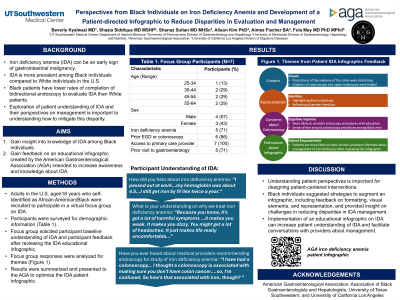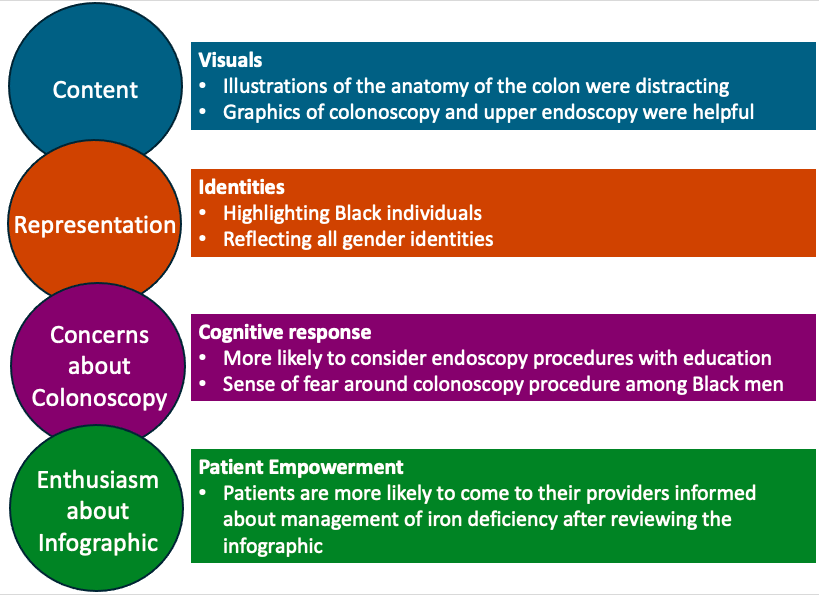Tuesday Poster Session
Category: Practice Management
P4928 - Perspectives from Black Individuals on Iron Deficiency Anemia and Development of a Patient-Directed Infographic to Reduce Disparities in Evaluation and Management
Tuesday, October 29, 2024
10:30 AM - 4:00 PM ET
Location: Exhibit Hall E

Has Audio

Beverly Kyalwazi, MD
University of Texas Southwestern Medical Center
Dallas, TX
Presenting Author(s)
Beverly Kyalwazi, MD1, Shazia M. Siddique, MD, MSHP2, Shahnaz Sultan, MD3, Alison M. Kim, PhD4, Aimee M. Fischer, BA4, Folasade May, MD, PhD5
1University of Texas Southwestern Medical Center, Dallas, TX; 2University of Pennsylvania, Philadelphia, PA; 3University of Minnesota and Minneapolis VA Health Care System, Minneapolis, MN; 4American Gastroenterological Association, Bethesda, MD; 5UCLA HEALTH, Culver City, CA
Introduction: Iron deficiency anemia (IDA) can be an early sign of gastrointestinal malignancy. Disparities in the evaluation and treatment of IDA have been documented, with Black patients having lower rates of recommended diagnostic testing. Studies have considered system-level and provider factors that influence these disparities; however, exploration of patient understanding of IDA and their perspectives on management is lacking. We conducted a focus group among Black individuals to gain insight into knowledge of IDA and perspectives on an educational infographic intended to increase awareness and knowledge about IDA.
Methods: Utilizing online and in-person outreach, we recruited adults in the United States age ≥18 years who self-identified as African American/Black to participate in a focus group on IDA. Participants were surveyed for demographic information. A focus group guide was developed with questions to solicit participant baseline understanding of IDA and their feedback after reviewing an IDA educational infographic.
Results: Our focus group consisted of 7 geographically diverse participants. 57% were age 45 to 64 and 57% identified as male (Table 1). The majority had prior upper endoscopy or colonoscopy (86%). Participants prior knowledge of IDA included personal experience with a diagnosis of IDA or having a family member or friend who was treated for IDA. We identified four major themes (Figure 1) from the focus group: 1) infographic content facilitated understanding of IDA though some medical illustrations were distracting; 2) representation, particularly race and sexual orientation, are important aspects for engaging Black patients; 3) participants felt the infographic would increase receptiveness of Black individuals to endoscopy; however, fear of colonoscopy was a perceived barrier for evaluating IDA, particularly among Black men; 4) participants were enthusiastic about the educational infographic.
Discussion: Implementation of an educational infographic on IDA can increase patient understanding of IDA and facilitate conversations with providers on management. Black focus group participants suggested strategies to augment an infographic, including feedback on formatting, visual elements, and representation, and provided insight on challenges in reducing disparities in IDA management. Our findings highlight the value of patient input when designing interventions. We plan to use this patient input to revise our patient-directed IDA educational infographic for use in clinical settings.

Note: The table for this abstract can be viewed in the ePoster Gallery section of the ACG 2024 ePoster Site or in The American Journal of Gastroenterology's abstract supplement issue, both of which will be available starting October 27, 2024.
Disclosures:
Beverly Kyalwazi, MD1, Shazia M. Siddique, MD, MSHP2, Shahnaz Sultan, MD3, Alison M. Kim, PhD4, Aimee M. Fischer, BA4, Folasade May, MD, PhD5. P4928 - Perspectives from Black Individuals on Iron Deficiency Anemia and Development of a Patient-Directed Infographic to Reduce Disparities in Evaluation and Management, ACG 2024 Annual Scientific Meeting Abstracts. Philadelphia, PA: American College of Gastroenterology.
1University of Texas Southwestern Medical Center, Dallas, TX; 2University of Pennsylvania, Philadelphia, PA; 3University of Minnesota and Minneapolis VA Health Care System, Minneapolis, MN; 4American Gastroenterological Association, Bethesda, MD; 5UCLA HEALTH, Culver City, CA
Introduction: Iron deficiency anemia (IDA) can be an early sign of gastrointestinal malignancy. Disparities in the evaluation and treatment of IDA have been documented, with Black patients having lower rates of recommended diagnostic testing. Studies have considered system-level and provider factors that influence these disparities; however, exploration of patient understanding of IDA and their perspectives on management is lacking. We conducted a focus group among Black individuals to gain insight into knowledge of IDA and perspectives on an educational infographic intended to increase awareness and knowledge about IDA.
Methods: Utilizing online and in-person outreach, we recruited adults in the United States age ≥18 years who self-identified as African American/Black to participate in a focus group on IDA. Participants were surveyed for demographic information. A focus group guide was developed with questions to solicit participant baseline understanding of IDA and their feedback after reviewing an IDA educational infographic.
Results: Our focus group consisted of 7 geographically diverse participants. 57% were age 45 to 64 and 57% identified as male (Table 1). The majority had prior upper endoscopy or colonoscopy (86%). Participants prior knowledge of IDA included personal experience with a diagnosis of IDA or having a family member or friend who was treated for IDA. We identified four major themes (Figure 1) from the focus group: 1) infographic content facilitated understanding of IDA though some medical illustrations were distracting; 2) representation, particularly race and sexual orientation, are important aspects for engaging Black patients; 3) participants felt the infographic would increase receptiveness of Black individuals to endoscopy; however, fear of colonoscopy was a perceived barrier for evaluating IDA, particularly among Black men; 4) participants were enthusiastic about the educational infographic.
Discussion: Implementation of an educational infographic on IDA can increase patient understanding of IDA and facilitate conversations with providers on management. Black focus group participants suggested strategies to augment an infographic, including feedback on formatting, visual elements, and representation, and provided insight on challenges in reducing disparities in IDA management. Our findings highlight the value of patient input when designing interventions. We plan to use this patient input to revise our patient-directed IDA educational infographic for use in clinical settings.

Figure: Focus Group Themes and Subthemes
Note: The table for this abstract can be viewed in the ePoster Gallery section of the ACG 2024 ePoster Site or in The American Journal of Gastroenterology's abstract supplement issue, both of which will be available starting October 27, 2024.
Disclosures:
Beverly Kyalwazi indicated no relevant financial relationships.
Shazia Siddique indicated no relevant financial relationships.
Shahnaz Sultan indicated no relevant financial relationships.
Alison Kim indicated no relevant financial relationships.
Aimee Fischer indicated no relevant financial relationships.
Folasade May: Exact Sciences – Advisor or Review Panel Member. Freenome – Consultant. Guardant – Consultant. Medtronic – Advisor or Review Panel Member.
Beverly Kyalwazi, MD1, Shazia M. Siddique, MD, MSHP2, Shahnaz Sultan, MD3, Alison M. Kim, PhD4, Aimee M. Fischer, BA4, Folasade May, MD, PhD5. P4928 - Perspectives from Black Individuals on Iron Deficiency Anemia and Development of a Patient-Directed Infographic to Reduce Disparities in Evaluation and Management, ACG 2024 Annual Scientific Meeting Abstracts. Philadelphia, PA: American College of Gastroenterology.
